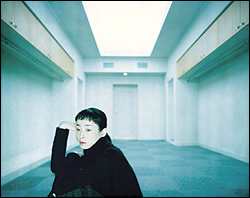Haruki Murakami, the Japanese master of fiction, also won fame for translating Raymond Carver, and there are parallels between his work and the Northwest’s great minimalist. But I think Murakami is still more minimalist than Carver, who didn’t mean to be as minimal as his editor, Gordon Lish, sometimes forced him to be: There’s such a thing as making a small, good thing worse by making it too damn small. Well you can’t get much more minimal than Murakami without vanishing into your ellipses. Also, Murakami paradoxically mixes realism with hallucinatory surrealism, affectless blankness with lush melancholy—all overlaid with a shiny prose flecked with consumer-society satire that reminds me of Brett Easton Ellis’ American Psycho minus the enthusiastic sex gore.
It’s a tall order to boil down Murakami’s hard-boiled word world into a floating-picture world, but Jun Ichikawa makes as impressive a stab at it as anyone is ever apt to make. Shots archly framed in high-lonesome, high-bourgeois homage to Edward Hopper pan to the right with the slow inexorability of the Space Needle’s rotation, each tableau interrupted by a wall of darkness like a panel in a graphic novel. There are no characters, just dreamlike archetypes in a fairy-tale plot. An amoral Japanese jazz musician spends World War II in an underworld nightclub, gets imprisoned, then freed, and impulsively names his son Tony after an American GI he likes.
There’s the ghost of a social critique: A boy grows up rich yet alienated thanks to suspicion of biraciality, MacArthur’s child in an Americanized economy. But this is a magical fable, not dirty realism, and Tony Takitani and his dad (both played by Issey Ogata) are flickering figures of light projected onto drifty wisps of smoke. Tony works as hard as his dad worked at not working; he’s a meticulous commercial illustrator, the opposite of a jazzman. He’s got a particular gift for sketching machines, since that’s what he is—a machine for producing glossy products and nameless anomie (cf. modern Japan).
Rich and lonesome, he hooks up with a young cutie (Rie Miyazawa) who’s as blank a soul as he—she’s a ghost wrapped in fancy clothes. Weirdly, her schmatte shopaholism obliquely causes catastrophe, so Tony replaces her with a Vertigo-like look-alike (also played by Miyazawa). This, too, ends in mysterious tears. In the end, though temperamentally his father’s opposite, Tony ends up in the same place, existentially.
All this deterministic doubling sounds heavy-handed, but it’s not. You never saw such exquisite lightness of touch. And yet I think the film inferior to Murakami’s prose. It mutes a story—published in The New Yorker three years ago—that was nearly mute to begin with, in a way Lish-ifying it, reducing it to an essence that alters that essence. Inevitable with a film adaptation, and I haven’t a clue how he might’ve done it better. Still, there it is: A Murakami story resonates, and Ichikawa’s film—perfectly executed according to its own terms—does not. (NR)








